December 14 – English football is looking for a new boss after the Football Association announced that Martin Glenn has resigned as CEO after four years at the helm and will leave his role in May next year.
The timing of the announcement is particularly interesting given that the sale of Wembley stadium collapsed only eight weeks ago and also means a new leader will have to be in place should England go ahead with a bid for the 2030 World Cup.
Under Glenn’s leadership, the FA has been criticised for its handling of various scandals and controversies. He oversaw Sam Allardyce’s departure as England manager after one game in charge and also had to manage the fallout from Mark Sampson’s dismissal as England women’s manager in 2017 after evidence of “inappropriate and unacceptable” behaviour with female players in a previous role.
Glenn also supported the sale of Wembley stadium to Fulham owner Shahid Khan which fell through when the millionaire businessman withdrew his offer.
But equally, Glenn can be credited with helping to vastly improve the fortunes of the national team, which reached the World Cup semi-finals for the first time in 28 years in Russia and has got to the inaugural finals of the UEFA Nations League. England’s women also reached the World Cup semis under his leadership.
Glenn also helped deliver unparalled success by England teams further down the age scale – largely as a result of the success of the country’s national football development centre. The men’s Under-17 and Under-20 teams both won their age-group World Cups.
The FA said Glenn was leaving having “delivered much of what he came to do”.
“On behalf of the Board of the FA, I would like to thank Martin for building and leading a senior management team that has transformed our organisation,” FA chairman Greg Clarke said in a statement.
“His integrity, commitment, energy and passion for football has underpinned the improvements on and off the pitch. The resulting commercial success has funded hugely significant change in the women’s game, St George’s Park (development centre), the FA Cup and the national teams.”
Clarke added that Glenn – who will follow Premier League executive chairman Richard Scudamore out of English football’s elite spotlight – was leaving an organisation that is “fit for purpose, more diverse, internationally respected and ready to progress to the next level”.
During his four years in charge the FA’s revenue has increased by 40%, which allowed the organisation to invest a record £127m into the game for the financial year ending 31 July 2017.
In his own statement, Glenn, who was a popular figure among FA staff, said: “I will leave feeling proud of the success of the performance of all the England teams” adding he hoped the FA would build on his legacy by “accelerating the breakthrough of English-qualified players into the first teams.”
Contact the writer of this story at moc.l1745010375labto1745010375ofdlr1745010375owedi1745010375sni@w1745010375ahsra1745010375w.wer1745010375dna1745010375

